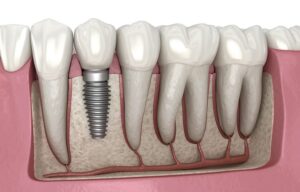When we lose one or more teeth, it is no longer an aesthetic question but it is our whole dentition that is likely to suffer. As with other dental treatments, prosthetic methods are developing and evolving, so with dental implants you can get the best results. The purpose of this is to artificially replace the root of missing teeth to establish a stable connection to the bone without connective tissue”, sums up dr. Máté Kelemen, dental surgeon, the principle of modern technology.
Dental implant medical consultation
Many people think that a dental implant is a single complete artificial tooth, when in fact it is just the screw-like part in the soft tissue, on which the abutments (so-called pillar) and a crown. The dental implant itself is therefore not visible, but its role is very important because it ensures that the prosthesis can be loaded in the same way as the original tooth.
It is also a common misconception that a dental implant can only be used if a single tooth is lost, i.e., if isolated teeth are missing. In reality, however, depending on the nature and location of the missing teeth, it can be an alternative in many cases, and can even be used to treat a completely toothless jaw. There are semi-fixed prostheses on four implants, but also dental bridges on six or eight implants. They are not traditional bridges, because the prostheses on implants do not damage the neighboring intact teeth since they do not serve as pillars.
Dental implant
A dental implant can only fulfill its function properly if it is surrounded by enough bone tissue in all three dimensions. However, the longer we delay care, the risk of bone loss increases. patient’s personalized implant treatment,” explains the specialist. In addition to the amount of bone tissue, the quality is also decisive; it is more difficult to achieve implant stability if the bone is too soft. This occurs in a relatively small percentage – osteoporosis or taking certain medications, for example – so it is important to have a complete medical history,
We do not have to give up the benefits of dental implants even if we do not have enough bone masses available, because with modern bone replacement procedures this problem can be solved in most cases. There are also many variations of this including Sinus Bone Regeneration, Membrane Bone Regeneration and Guided Bone Regeneration. Whenever possible, our specialists strive to use our own bone tissue, which means that bone chips are obtained from other areas of the oral cavity and applied to an area of bone deficiency mixed with a substitute artificial bone. It is then covered with a membrane that protects it from external influences, and over an average healing time of 6 to 8 months, this forms healthy bone tissue in the bone replacement area. This is the first step to regaining our healthy dentures. The dental implant can then be placed, which we will tell you about in our next professional article.



